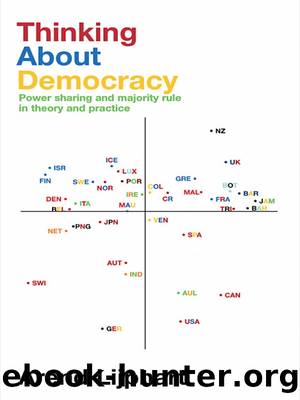Thinking About Democracy: Power Sharing and Majority Rule In Theory and Practice by Arend Lijphart

Author:Arend Lijphart [AREND LIJPHART]
Language: eng
Format: epub
Publisher: Taylor & Francis
Published: 2011-09-30T16:00:00+00:00
Deadlock and presidential weakness in the United States are also the chief complaints of the Committee on the Constitutional System (see Robinson 1985). A possible explanation of why American presidents have not felt as frustrated by their lack of power as their Latin American colleagues is that the United States is a major player on the world scene and that foreign policy has provided American presidents with a sufficiently satisfying outlet for their political energies; the general pattern is that, during their terms of office, they tend to direct more and more of their attention and energy toward foreign policy issues.
It is not immediately clear, however, why a situation of balanced presidential and legislative power should produce deadlock and frustration instead of consensus. It seems to me that the problem of what Linz (1987, 26) calls ‘‘dual democratic legitimacy’’ – the fact that both president and legislature can claim democratic legitimation – is only part of the answer. The same problem potentially arises with regard to bicameral systems, consisting of directly elected houses with different partisan compositions, and also with regard to the federal division of powers. Indeed, all of the characteristics of consensus democracy may be seen as attempts to prevent a single ‘‘democratic legitimacy,’’ which would necessarily be a single concentration of power.
As I see it, the real problem is not so much that both president and legislature can claim democratic legitimacy but that everyone – including the president, the public at large, and even political scientists – feels that the president’s claim is much stronger than the legislature’s. One indicator of this is that we have great difficulty envisaging a system in which the legislature has the power to dismiss a popularly elected president, but that we can readily conceive of a president’s power to dissolve the legislature – in spite of the fact that, after all, the legislature is also popularly elected. President Charles de Gaulle’s grandiose statement is an extreme example of the claim of superior democratic legitimacy: ‘‘The indivisible authority of the state is entirely given to the president by the people who elected him. There exists no other authority, neither ministerial, nor civil, nor military, nor judicial that is not conferred or maintained by him.’’ A less extreme version of this claim in the United States is the reminder that the president (together with the vice president) is the only official elected by the whole people – a fact that supposedly gives the president a unique democratic legitimacy. Like de Gaulle’s claim, this interpretation conveniently forgets that the Congress is also popularly elected and that, as a collective body, it is also elected by the whole people – indeed with larger majorities than are usually garnered by successful presidential candidates. Consequently, although a president’s lack of decisive power should induce him or her toward seeking consensus and compromise, the feeling of superior democratic legitimacy may make the president righteously unwilling and psychologically unable to compromise.
If this line of reasoning is correct, presidentialism is inferior to parliamentarism regardless of whether the president is strong or weak.
Download
This site does not store any files on its server. We only index and link to content provided by other sites. Please contact the content providers to delete copyright contents if any and email us, we'll remove relevant links or contents immediately.
American Kingpin by Nick Bilton(3886)
Future Crimes by Marc Goodman(3600)
The Meaning of the Library by unknow(2571)
Inside the Middle East by Avi Melamed(2356)
Why Nations Fail: The Origins of Power, Prosperity, and Poverty by Daron Acemoglu & James Robinson(2297)
On Tyranny by Timothy Snyder(2232)
Living Silence in Burma by Christina Fink(2071)
Putin's Labyrinth(2022)
The Mastermind by Evan Ratliff(1937)
The Smartest Kids in the World by Amanda Ripley(1856)
Think Like a Rocket Scientist by Ozan Varol(1821)
Law: A Very Short Introduction by Raymond Wacks(1748)
It's Our Turn to Eat by Michela Wrong(1731)
The Rule of Law by Bingham Tom(1698)
Philosophy of law a very short introduction by Raymond Wacks(1670)
Leadership by Doris Kearns Goodwin(1638)
A Dirty War by Anna Politkovskaya(1630)
Information and Communications Security by Jianying Zhou & Xiapu Luo & Qingni Shen & Zhen Xu(1621)
Civil Procedure (Aspen Casebooks) by Stephen C. Yeazell(1556)
